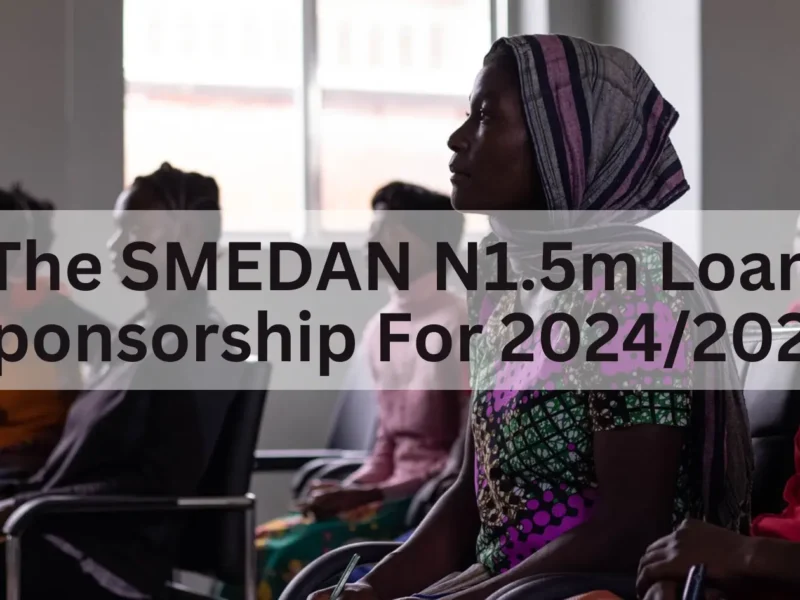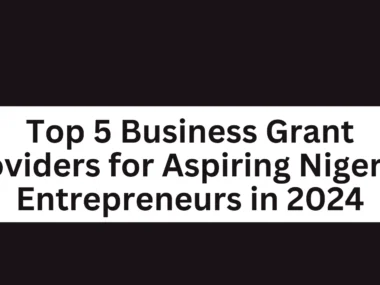Are you a small business owner in Nigeria dreaming of expanding your operations but are hindered by financial constraints? Look no further!
The Small and Medium Enterprises Development Agency of Nigeria (SMEDAN), in collaboration with esteemed partners like the Bank of Agriculture (BOA) and Jaiz Bank Plc, presents a golden opportunity through its N1.5 million loan sponsorship.
This initiative is tailor-made to supercharge the growth of micro and small enterprises across diverse sectors, empowering you to transform challenges into opportunities.
Dive into the specifics of how the SMEDAN N1.5 million loan can be a game-changer for your business, understand the seamless application process, and discover how you can be part of this economic revolution.
Let’s unlock the potential of your business and set the stage for unprecedented growth and success!
Overview of SMEDAN’s N1.5m Loan Sponsorship
The SMEDAN N1.5m loan sponsorship is designed to assist micro and small enterprises in various sectors, including agriculture, manufacturing, and services, that are labor-intensive and have the potential to scale up operations and increase employment.
These loans are part of a broader strategy to enhance the productivity of small businesses, making them more competitive both locally and in the wider market.
Eligibility Criteria
To qualify for the SMEDAN N1.5 million loan sponsorship, micro and small enterprises (MSEs) in Nigeria must meet a series of eligibility criteria designed to ensure that the funding is directed towards businesses poised for growth and development.
These criteria aim to support the economic landscape by fostering enterprises that are not only viable but also have the potential to contribute significantly to job creation and local production.
Here’s a detailed look at the eligibility requirements:
1. SMEDAN Registration
Businesses must be registered with the Small and Medium Enterprises Development Agency of Nigeria (SMEDAN) and possess a SMEDAN Unique Identification Number (SUIN).
This registration helps to ensure that the enterprise is recognized officially and operates within the legal framework set out for businesses in Nigeria.
2. Operational Sector
The program targets micro and small enterprises across various sectors that are labor-intensive. This includes, but is not limited to, agriculture, manufacturing, and services.
The focus is particularly on enterprises that add value through innovative products or services that have the potential to scale.
3. Regulatory Compliance
Eligible businesses must comply with all relevant local regulations. This includes having proper registrations such as a Corporate Affairs Commission (CAC) registration number and, where applicable, a National Agency for Food and Drug Administration and Control (NAFDAC) registration for businesses involved in the food sector.
4. Financial Records
Applicant businesses should have clear financial records that demonstrate the business’s viability and potential for growth. This might include audited financial statements or clear records of financial transactions.
5. Local Raw Material Usage
Preference is given to enterprises that utilize local raw materials, with a stipulation in some cases that at least 65% of the materials used should be sourced locally.
This criterion supports the government’s initiative to boost local production and reduce reliance on imported goods.
6. Employment Potential
The enterprise should have the potential to create additional employment. Often, a requirement is set for the enterprise to be able to employ a certain number of additional people as a result of the loan, enhancing its impact on the local economy.
7. Business Plan
Applicants must submit a comprehensive business plan that details how the loan will be utilized to grow the business.
The plan should outline strategic goals, financial projections, and the anticipated impact on the business’s growth and employment creation.
These criteria are designed to ensure that the loans are awarded to businesses that are not only in need of financial assistance but also have a clear plan for growth and a potential positive impact on the community and economy.
Compliance with these standards helps maintain the integrity and effectiveness of the SMEDAN loan sponsorship program.
- Registration: Businesses must be registered with SMEDAN and obtain a SMEDAN Unique Identification Number (SUIN).
- Operational Sector: The business should be operating within the MSE sector with a focus on labor-intensive activities.
- Compliance: Must be compliant with local regulations and utilize a significant portion of local raw materials.
Loan Terms and Features
The loan amounts range from N1.2 million to N5 million, tailored to the needs of small businesses aiming for expansion and modernization. Here’s a closer look at the terms:
- Interest Rate: Fixed at 9% per annum, these terms are designed to be affordable to ensure they do not strain the financial health of the enterprise.
- Repayment Period: Up to 30 months with a flexible moratorium period that varies based on the enterprise type and setup.
- Collateral Waiver: In an effort to make these loans accessible, traditional collateral requirements are waived, though other securities like the Bank Verification Number (BVN) and Global Standing Instruction (GSI) are required.
How to Apply
Applying for the SMEDAN N1.5m loan involves several steps designed to ensure transparency and fairness:
- Pre-Qualification: Begin by registering on the SMEDAN official website and completing the pre-qualification form.
- Business Plan Submission: After pre-qualification, submit a detailed business plan that outlines the intended use of the funds and the potential impact on your business.
- Evaluation and Approval: Submitted business plans undergo a thorough review process. If approved, further steps include field validation and final disbursements.
FAQs about the SMEDAN N1.5m Loan Sponsorship
Q1: What are the main objectives of the SMEDAN N1.5m loan? The SMEDAN loan primarily aims to support the growth and sustainability of micro and small enterprises in Nigeria by providing them with the necessary financial support to enhance their operations and competitiveness.
Q2: Who can apply for this loan? The loan is available to micro and small enterprises registered with SMEDAN and operating in labor-intensive sectors that contribute to the economy’s real sector.
Q3: What are the repayment terms of the loan? The loan is repayable over a period of up to 30 months with a fixed interest rate of 9% per annum, including a flexible moratorium period based on the business type.
Q4: Are there any special requirements for the loan application? Yes, besides the basic registration and compliance with regulatory requirements, applicants must provide their BVN, comply with the GSI mandate, and in some cases, provide a NAFDAC registration number if they are involved in food production.
Conclusion
The SMEDAN N1.5m loan sponsorship is a strategic initiative by the Nigerian government to empower small businesses, which are the backbone of the economy.
By providing financial support under favorable terms, SMEDAN is not only helping businesses to grow but also fostering a more robust economic environment that encourages job creation and reduces poverty.
For entrepreneurs looking to take their businesses to the next level, this loan represents a viable opportunity to secure the funding needed for expansion and operational efficiency.



